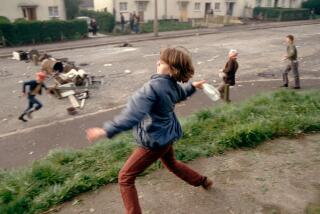Ulster Defense Regiment Troops Live on Firing Line in Violent Province
- Share via
BELFAST — “My wee girl of 5 cannot understand why I keep saying to her, ‘Never tell people your daddy is a soldi”
Crouching in the back of an armored Land Rover patrolling the deadly back streets of Belfast, the soldier gives a fatalistic shrug of the shoulders and accepts that he will always be in the firing line.
He is a member of the Ulster Defense Regiment, the largest regiment in the British Army, responsible for 85% of the patrolling duties in the strife-torn province of Northern Ireland.
The most senior officers in the 6,500-strong regiment come from the British mainland. The rest are from Northern Ireland in a regiment where 55% are part-timers, the perfect “soft target” for Irish Republican Army guerrillas battling to oust Britain.
Most Were Off Duty
Grim statistics on the Belfast battalion wall highlight the costs. Of the 177 Ulster Defense Regiment members killed since its beginning in 1970, 134 were off duty. They worked as postmen, accountants and electricians, easily marked men in tight-knit, tribal communities.
The regiments making up the rest of the British army have lost 410 soldiers since the first units were sent to the province in 1969.
The Ulster Defense Regiment is made up almost exclusively of Protestants, and the largely local force is resented across a wide spectrum of the Irish nationalist community with moderate Catholic politicians arguing that it should be disbanded and the IRA quick to intimidate anyone contemplating membership.
Ten Ulster Defense Regiment men have been killed this year. The latest to die was dragged from a Belfast shoe shop and shot dead in front of his wife and 2-year-old daughter.
Farmers Armed for Plowing
Farmers have to plow their fields with a gun in their back pockets. A plumber wears a bullet-proof flak jacket. Maybe he will be targetted on patrol that night.
The pressures follow the soldier at night when he goes home, not to some secure barracks.
The Belfast soldier, a street-wise figure with eyes constantly searching for the rooftop sniper, said, “There is always a gap in your security awareness. You tend to think it will never happen to you.
“You can be late for work one morning and forget to look under the car for bombs. You have to send the wife to the door when someone knocks. You have to check who it is from an upstairs window.”
Women on Patrol
Also on patrol is a member of the Green Finches, the women’s contingent in the Ulster Defense Regiment.
A divorcee with two sons in the British Army, she said, “Every time there is a UDR death, it makes you ever more determined to go on. If you think about it too long, it gets hard.
“I joined because I wanted to do something for my country. Now it’s because I enjoy it.”
The Land Rover manhole cover bangs open with a loud thud as two soldiers take up “top cover” positions to ensure that no one tries to hurl a grenade.
Much laughter on the patrol is provoked when a reporter jumps off his seat at the sound of the cover clanging onto the roof.
Local Knowledge Invaluable
A senior officer from Britain highlights how invaluable the Ulster Defense Regiment soldier’s local knowledge can be against a guerrilla foe who melts into the local community and relies on it for support.
“These guys have grown up with the terrorists. It’s a jungle drums situation out there. They used to throw rocks at each other when they were kids.”
About 3% of the UDR comes from the north’s Catholic minority.
Seamus Mallon, a leader of the moderate Catholic Social Democratic and Labor Party, said, “They have not earned the respect of the Catholic nationalist community. Most people see them as part of the problem, not the solution.”
Sixteen UDR members have been convicted of murder, and the senior officer admitted, “We have got our bad eggs. We have to put our house in order. We have got to be whiter than white.”
Catholic in UDR Praised
Among the picturesque country lanes of Antrim where IRA terrorists hide their weapons, a senior officer from Britain is lavish in praise of the few serving UDR Catholics there.
“They really are the bravest of the brave. They will probably have to give up going to church. They will probably put their children in Protestant schools,” he said.
The patrol passes a derelict bridge where soldiers the week before had found two guns hidden under the crumbling arches.
It screeches to a halt on a straight stretch of road and sets up a snap checkpoint to search cars and vans, ever on the lookout for arms being moved into Belfast or Londonderry.
Two soldiers crouch in ditches, ready to open fire and pull a spiked chain across the road in case anyone fails to stop.
Amateur Psychiatrist
The corporal, clearly priding himself on being an amateur psychiatrist in the job, said, “Most of the real terrorists would brazen it out. The nicer they are, the more careful you have to be.
“Sometimes we get people grinding to a halt and trying to turn round because they have just been getting drunk at the pub. We have young lads out joy-riding in stolen cars.”
But soon the mobile checkpoint is up and away. That corner of Antrim may never be picked again because, as the corporal concludes with a wary roadside look over his shoulder, “We cannot get into a pattern. Otherwise, there would be a bomb behind that wall next time.”
More to Read
Sign up for Essential California
The most important California stories and recommendations in your inbox every morning.
You may occasionally receive promotional content from the Los Angeles Times.










